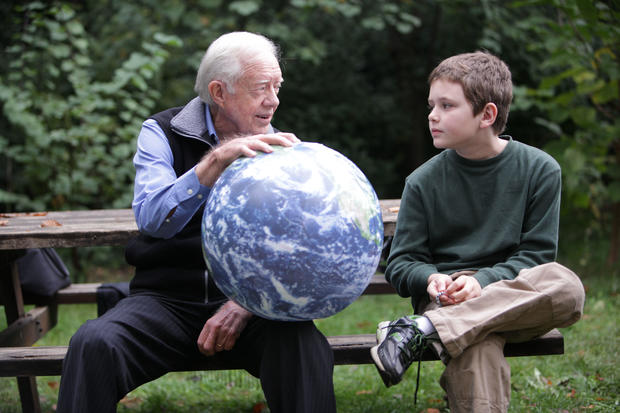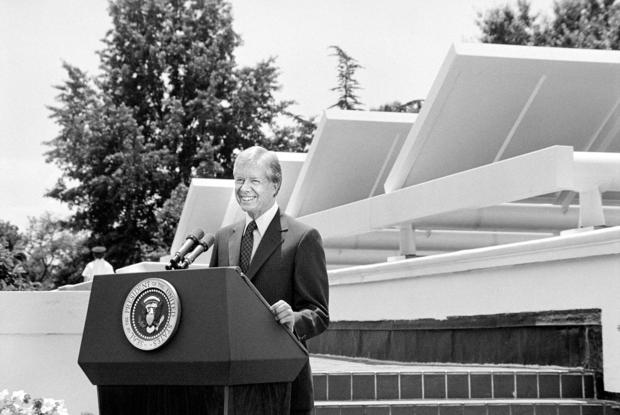For Jimmy Carter, protecting environment has been an
One of the most enduring aspects of Jimmy Carter’s presidency is his green legacy — he embraced environmental stewardship and renewable energy with an enthusiasm that would not be matched by political leaders in the U.S. for decades.
Environmentalists and conservationists agree on the import of Carter’s accomplishments in this arena: He protected more than a million acres of land and waterways, worked to create national energy standards, and in response to the energy crisis in the 1970s, created the Department of Energy to develop alternative sources — like solar and wind power — that would help move the U.S. toward energy independence.
But Carter’s commitment to environmentalism began long before he entered the White House. On his father’s farm in southwest Georgia, he spent much of his childhood outdoors and barefoot, hunting and fishing with friends.
“One of my most vivid memories of my childhood was of the earth.There was a closeness, almost an immersion, in the sand, loam, and red clay that seemed both natural and constant. I remember how enjoyable it was to walk behind a plow. My bare feet caressed by the soft and cool freshly turned earth, ” Carter once said. “I learned early on, if we take care of the land, it will take care of us.”
Jeff Moore/The Elders via Getty Images
As an adult, he owned his family’s peanut farm and by 1967 was a charter member of the Georgia Conservancy. As governor, his reputation for conservation grew. He established the Georgia Heritage Trust, which worked to protect state lands, and kept the Army Corps of Engineers from constructing dams along some Georgia rivers.
Carter’s chief White House domestic policy adviser, Stuart E. Eizenstat, told CBS News that by the time he got to Washington, Carter’s goal was to raise public awareness around conservation and climate change.
“He was always looking to the future on environment,” said Eizenstat.
Carter shared with White House staff his desire to leave an environmental legacy that rivaled that of Theodore Roosevelt, who created the National Park Service.
Two weeks after his inauguration, Carter famously instructed Americans to turn down their thermostats in an effort to preserve energy, adding that one of his “most urgent” goals was to develop a national energy policy in order to become less dependent on foreign suppliers.
Universal History Archive/Universal Images Group via Getty Images
Carter oversaw the installation of solar panels at the White House. Eizenstat said it was more than a unique photo opportunity for Carter; he wanted to publicly show his support for renewable energy and bring its existence into the mainstream.
Early in his presidency, Carter also pursued legislation that would “underscore the importance of environmental protection in all our lives,” he wrote in an address to Congress. Eizenstat said that Carter wanted environmental issues to be a “key part of his administration.”
Carter biographer Kai Bird, told CBS News that Carter was willing to push his environmental policies at the expense of his political popularity — often coming into conflict with his own party. Bird added that conservation and renewable energy would have been an even bigger focus had Carter been elected to a second term. Not being able to do so, Bird said, was one of Carter’s regrets from his time in Washington.
But it was in the 11-week window between losing reelection and leaving office that Carter signed some of his most important environmental bills, including legislation that protected more than 100 million acres of Alaskan land and more than doubled the size of the National Park System, and legislation that created what is known as the “Superfund,” which manages hazardous and toxic waste cleanup.
“We used to joke that the worst way to convince him to do something we recommended was to say it would help him politically,” said Eizenstat. “[Conservation] was much more than just a policy. It was central to his whole outlook on life.”
Conservation as a philosophy was an outgrowth of Carter’s Christian faith.
“This was a person who, as an act of faith, scientific understanding and commitment to intergenerational equity, was effectively and passionately dedicated to being a thoughtful steward of nature and public lands,” said Deborah Williams, a former special assistant to the secretary of the Interior under President Clinton.
“I have never been happier, more exhilarated, at peace, rested, inspired and aware of the grandeur of the universe and the greatness of God than when I find myself in a natural setting not much changed from the way He made it,” Carter wrote in “An Outdoor Journal.”
Williams, who has worked with Carter for decades and remains close to the former president, told CBS News that he has never lost his sense of responsibility for the environment and was even being briefed on Alaskan conservation issues days before he entered hospice care in February.
“He has such deep faith. That was a motivation for him to protect God’s creation and the resources that God has provided. And we have to be responsible stewards of what we have been bequeathed,” she said. “It’s just his very core.”
For all the latest Automobiles News Click Here
For the latest news and updates, follow us on Google News.



